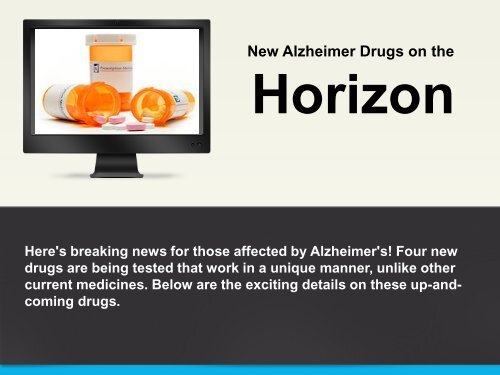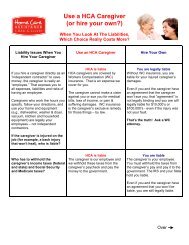New Alzheimer Drugs on the Horizon!
Create successful ePaper yourself
Turn your PDF publications into a flip-book with our unique Google optimized e-Paper software.
<str<strong>on</strong>g>New</str<strong>on</strong>g> <str<strong>on</strong>g>Alzheimer</str<strong>on</strong>g> <str<strong>on</strong>g>Drugs</str<strong>on</strong>g> <strong>on</strong> <strong>the</strong><br />
Horiz<strong>on</strong><br />
Here's breaking news for those affected by <str<strong>on</strong>g>Alzheimer</str<strong>on</strong>g>'s! Four new<br />
drugs are being tested that work in a unique manner, unlike o<strong>the</strong>r<br />
current medicines. Below are <strong>the</strong> exciting details <strong>on</strong> <strong>the</strong>se up-andcoming<br />
drugs.
Anatomy Of<br />
ALZHEIMER'S<br />
The entities resp<strong>on</strong>sible for <str<strong>on</strong>g>Alzheimer</str<strong>on</strong>g>'s disease are plaques and tangles.<br />
Plaques are protein fragments called amyloid that accumulate between<br />
brain cells. Tangles are twisted protein fibers that form inside <strong>the</strong> cells.<br />
These protein clumps block communicati<strong>on</strong> and disrupts cellular<br />
processes.<br />
To see a diagram of plaques and tangles, go to<br />
http://www.save<strong>the</strong>synapse.com/wp/wpc<strong>on</strong>tent/uploads/2011/11/plaque.jpg.
Plaques And<br />
Tangles<br />
The development of plaques and tangles is a normal aspect of aging.<br />
However, when <strong>the</strong> process becomes widespread, it significantly impairs<br />
mental functi<strong>on</strong>. An <str<strong>on</strong>g>Alzheimer</str<strong>on</strong>g>'s brain exhibits protein clumps in a<br />
characteristic pattern. The abnormality originates in brain regi<strong>on</strong>s<br />
involved in memory and <strong>the</strong>n spreads to o<strong>the</strong>r areas. Eventually, brain<br />
cells die, causing <strong>the</strong> signs and symptoms of <str<strong>on</strong>g>Alzheimer</str<strong>on</strong>g>'s disease (AD).
ANTIBODY<br />
DEFENSE<br />
Preliminary testing of a new drug has shown it to reduce <strong>the</strong> decline<br />
in memory and thinking skills in <strong>the</strong> early stages of AD. The<br />
medicati<strong>on</strong> is called Adu can mab. It works like an antibody, attacking<br />
plaques. An antibody is a protein that identifies and neutralizes alien<br />
invaders.
LANDMARK<br />
S T U D Y<br />
The Adu can mab investigati<strong>on</strong> was initiated in <strong>the</strong> summer of 2012. It<br />
involved 166 adults in <strong>the</strong> early stages of AD. All <strong>the</strong> subjects had<br />
evidence of plaque build-up. Patients were divided into four groups,<br />
receiving ei<strong>the</strong>r low, medium, or high drug doses or a placebo. In<br />
March 2015, an interim analysis of <strong>the</strong> first data was reported.
F<br />
I<br />
N<br />
DI N G S<br />
The outcome at <strong>on</strong>e year was m<strong>on</strong>umental! The higher <strong>the</strong> drug dose, <strong>the</strong><br />
fewer patients erred <strong>on</strong> clinical tests of memory and thinking. Aducanumab<br />
subjects dem<strong>on</strong>strated 70 percent less mental decline than placebo patients!<br />
Study participants also underwent brain imaging, with radioactive tracers<br />
used to identify brain plaques. Aducanumab reduced plaque depositi<strong>on</strong> in six<br />
brain regi<strong>on</strong>s. In placebo subjects, protein clumps remained unchanged.<br />
Low doses of <strong>the</strong> drug didn’t impact brain plaque. However, both medium and<br />
high doses noticeably lowered plaque levels.
SIDE<br />
EFFECT<br />
Most of <strong>the</strong> study participants tolerated <strong>the</strong> medicati<strong>on</strong> well. Brain<br />
scans of those <strong>on</strong> <strong>the</strong> higher doses revealed some brain swelling.<br />
Although <strong>the</strong> inflammati<strong>on</strong> did not produce symptoms, researchers<br />
are c<strong>on</strong>cerned about future problems. Brain swelling was most<br />
pr<strong>on</strong>ounced in patients carrying <strong>the</strong> gene for AD. Headaches arose in<br />
22 percent of patients given <strong>the</strong> drug, appearing to be dose-related.<br />
The headaches quickly resolved.
Aducanumab is a pi<strong>on</strong>eer in <strong>the</strong> fight against AD. To date, <strong>the</strong>re have been no o<strong>the</strong>r<br />
medicati<strong>on</strong>s that destroy brain plaques. Current drugs decelerate <strong>the</strong> disease process<br />
temporarily but are unable to halt completely its progressi<strong>on</strong>. Aducanumab<br />
significantly retards plaque formati<strong>on</strong>.<br />
The drug is <strong>the</strong> brainchild of <strong>the</strong> Biogen company, based in Massachusetts. Clinical<br />
testing is in <strong>the</strong> final Phase 3 stage. This segment of evaluati<strong>on</strong> involves a large study<br />
group of 1,350 patients over five years. Thorough testing <strong>on</strong> a broad scale is required<br />
before <strong>the</strong> drug can be marketed. Analysts expect that within three years, <strong>the</strong> data will<br />
indicate whe<strong>the</strong>r Adu can mab is <strong>the</strong> "Goldilocks" drug, <strong>the</strong> "just right" formulati<strong>on</strong><br />
that will resolve AD. Researchers are optimistic regarding <strong>the</strong> drug's potential.
JOINING<br />
CRUSADETHE<br />
Also in <strong>the</strong> testing phase are three o<strong>the</strong>r medicati<strong>on</strong>s, solanezumab,<br />
gantenerumab, and crenezumab.<br />
Solanezumab - The drug manufacturer Eli Lilly is testing this drug. Solanezumab<br />
is also designed to attack brain plaques. The drug appears to help mild AD.<br />
Gantenerumab - Roche Pharmaceuticals has produced this anti-amyloid drug.<br />
Data from spinal fluid tests and brain scans are promising.<br />
Crenezumab - The Genentech company has formulated this drug, targeted to mild<br />
AD. Research is now in <strong>the</strong> Phase 3 stage.
CURRENT DRUG<br />
M E C H A N I S M S<br />
Current drugs work by relieving some AD symptoms. However, <strong>the</strong>y do not address <strong>the</strong><br />
cause of AD or delay its advancement. The FDA has approved two classes of drugs for <strong>the</strong><br />
treatment of <str<strong>on</strong>g>Alzheimer</str<strong>on</strong>g>'s disease. Until alternative medicati<strong>on</strong>s are marketed, <strong>the</strong>se are <strong>the</strong><br />
two opti<strong>on</strong>s available:<br />
•Cholinesterase Inhibitors<br />
•Memantine<br />
Each drug acts <strong>on</strong> a different brain regi<strong>on</strong>, so physicians sometimes prescribe both<br />
simultaneously. The medicati<strong>on</strong>s are also designed for specific stages of AD - mild,<br />
moderate, and severe. These delineati<strong>on</strong>s are based <strong>on</strong> mental functi<strong>on</strong> test scores,<br />
measuring memory, thinking, reas<strong>on</strong>ing, and awareness of time and place.
CHOLINESTERASE<br />
INHIBITORS (CIs)<br />
Plaques and tangles decrease levels of acetylcholine, a chemical involved in<br />
memory, alertness, thought, and judgment. CIs prevent <strong>the</strong> breakdown of<br />
acetylcholine. Unfortunately, <strong>the</strong> drugs are unable to stop disease progressi<strong>on</strong>.<br />
Although <strong>the</strong>y make acetylcholine more available, brain cells c<strong>on</strong>tinue to die.<br />
Therefore, <strong>the</strong> drugs lose <strong>the</strong>ir effectiveness over time.<br />
There are three FDA-approved CIs. In clinical studies, all of <strong>the</strong>m work equally<br />
well. However, individual resp<strong>on</strong>se varies regarding drug performance and side<br />
effects. Symptoms include nausea, vomiting, and diarrhea. Side effects are<br />
reduced when a drug is started at a low dose and gradually increased. Taking a CI<br />
with food also helps minimize discomfort. The three CIs comm<strong>on</strong>ly prescribed are<br />
Aricept, Razadyne, and Exel<strong>on</strong>.
ARICEPT<br />
Aricept - treats all stages of AD. It is taken <strong>on</strong>ce a day in pill form. It is<br />
typically well-tolerated, with side effects occurring in <strong>on</strong>ly 20 percent of<br />
people with AD.<br />
Razadyne - targets mild to moderate AD and is available as a pill and<br />
syrup. It has been shown to slow cognitive decline for up to three years.<br />
Exel<strong>on</strong> - for mild to moderate AD, available as a skin patch, pill, and<br />
syrup. It is comparable to Aricept regarding efficacy but may cause more<br />
gastrointestinal side effects.
Memantine<br />
Under <strong>the</strong> brand name Namenda, this medicati<strong>on</strong> addresses moderate<br />
to severe AD. It has a different treatment mechanism. It regulates<br />
glutamate, a chemical involved in learning and memory. Namenda is<br />
formulated as a pill and syrup. Comm<strong>on</strong> side effects include a<br />
headache, c<strong>on</strong>fusi<strong>on</strong>, dizziness, and agitati<strong>on</strong>.
STAY TUNED!<br />
Alzforum has <strong>the</strong> most current informati<strong>on</strong> available <strong>on</strong> <strong>the</strong> four drugs. The<br />
website's August 2015 report summarizes <strong>the</strong> outcome of this year's<br />
<str<strong>on</strong>g>Alzheimer</str<strong>on</strong>g>'s Associati<strong>on</strong> Internati<strong>on</strong>al C<strong>on</strong>ference.<br />
Aducanumab - Researchers are trying to determine <strong>the</strong> optimal dose of Adu<br />
can mab. Three dosages have underg<strong>on</strong>e trial, 3 mg, 6 mg, and 10 mg, with<br />
n<strong>on</strong>e of <strong>the</strong>m quite hitting <strong>the</strong> mark. The 10 mg dose is most effective against<br />
plaques but causes brain swelling. It was thought that a 6-mg dose would be<br />
ideal, but it has not delivered <strong>the</strong> desired outcome. Phase 3 of <strong>the</strong> study will<br />
c<strong>on</strong>tinue exploring drug dosages versus side effects.
Solanezumab - Research <strong>on</strong> solanezumab has shown a 34 percent decline in disease<br />
progressi<strong>on</strong>! Phase 3 for solanezumab will be complete by October 2016.<br />
Gantenerumab - Study of Gantenerumab has yielded gains in biomarker data. A biomarker is<br />
a biological indicator of disease. The trial has promoted a greater understanding of <strong>the</strong><br />
nature of AD. Patients with severe AD have had a positive resp<strong>on</strong>se at a high dose, with a 5<br />
percent reducti<strong>on</strong> in brain plaque. Roche is moving into Phase 3, to assess fur<strong>the</strong>r <strong>the</strong> effects<br />
of high doses.<br />
Crenezumab - This medicati<strong>on</strong> does not cause brain swelling, enabling use at higher doses.<br />
The drug shows promise as a treatment for mild AD. It's also being tested as a preventative<br />
drug, <strong>the</strong> first of its kind! Study results will be forthcoming in 2020.
EYES ON<br />
THE<br />
PRIZE<br />
Aducanumab is <strong>the</strong> first drug to exhibit a dual effect <strong>on</strong> both plaque<br />
destructi<strong>on</strong> and cognitive decline. C<strong>on</strong>clusive data is three years away. The<br />
outcome of solanezumab will be evident <strong>on</strong>e year from now. Results of<br />
gantenerumab and crenezumab will follow.<br />
As research efforts get closer to a cure for AD, we can be grateful for <strong>the</strong><br />
diligence of scientists. With <strong>the</strong>ir c<strong>on</strong>tinued perseverance, we can look<br />
forward to <strong>the</strong> day when AD is a faded memory.
SOURCES<br />
1. https://www.alzinfo.org/articles/diagnosis/experimental-alzheimers-drug-aducanumab-slows-cognitivedecline-in-early-trials/<br />
2. http://www.alzforum.org/<strong>the</strong>rapeutics/aducanumab<br />
3. http://www.alzforum.org/<strong>the</strong>rapeutics/crenezumab-0<br />
4. http://www.alzforum.org/news/c<strong>on</strong>ference-coverage/aducanumab-solanezumab-gantenerumab-data-liftcrenezumab-well<br />
5. http://www.mayoclinic.org/diseases-c<strong>on</strong>diti<strong>on</strong>s/alzheimers-disease/in-depth/alzheimers/art-20048103<br />
6. http://blogs.discovermagazine.com/d-brief/2015/03/20/drug-alzheimers-disease/#.VkN64-Lw9uY
#Thank you!<br />
Home Care Assistance of Greater Phoenix offers hourly and live-in home<br />
care for seniors in Phoenix, AZ. We provide senior care services to elderly<br />
and adults who need assistance. Free In-Home Care C<strong>on</strong>sultati<strong>on</strong>. Call us<br />
today at (602) 388-1085 to discuss <strong>the</strong> hourly and live-in care opti<strong>on</strong>s for<br />
you or your loved <strong>on</strong>e.<br />
Address: 3143 E Lincoln Dr.Phoenix, AZ 85016<br />
Web: http://www.homecareassistancephoenix.com/<br />
--------------------------------------------------------------------------------------------------










![Projected Senior Populations in the State of Ohio [Infographic]](https://img.yumpu.com/54840652/1/190x107/projected-senior-populations-in-the-state-of-ohio-infographic.jpg?quality=85)